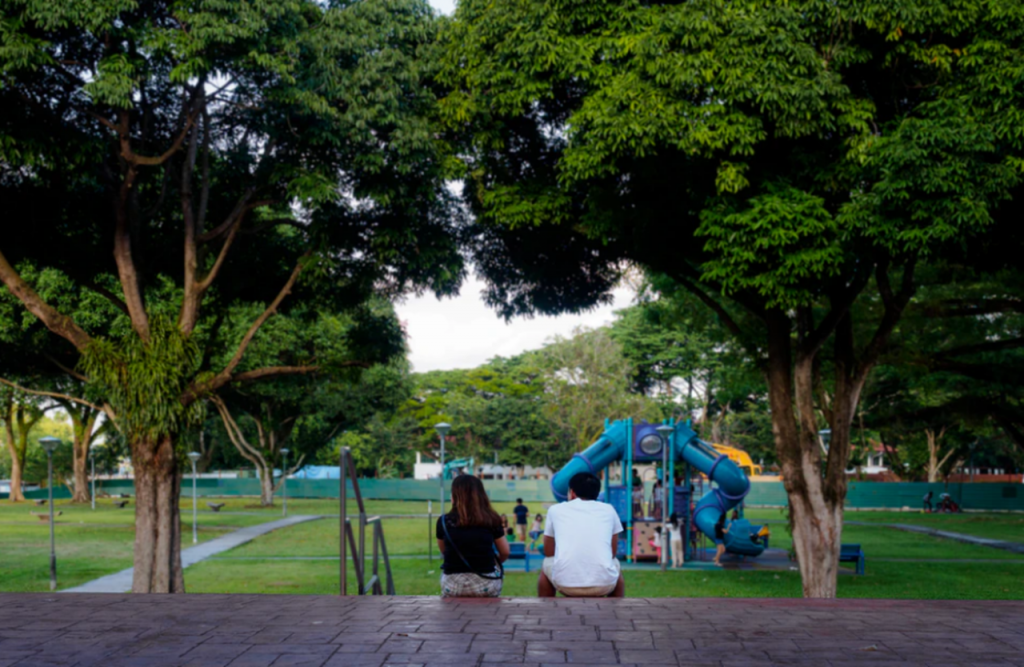Top image: Rosalind Chang/Unsplash
A couple of weeks before writing this piece, I did something I almost never do: I called a friend one afternoon, asked if he had time to chat, and broke down.
In that moment, the desire to not be alone only just outweighed the agony of letting anyone see me like this. I admitted that I’d cried constantly for the last few months, that I was sometimes so overwhelmed I could barely write. At the heart of it was a deep and lingering shame that I had no right to be feeling this miserable.
Although my friend was nothing but kind and patient, I apologised repeatedly for rambling and wasting his time; I probably spent more time mumbling ‘sorry’ over and over again than explaining what was wrong. And while I felt unquestionably better after putting down the phone, every minute on the line was excruciating.
Simply acknowledging my struggles with mental health has never stopped feeling like a personal failing, much as I know that this is not the case.
Over the last few years in particular, efforts to chip away at the taboo shrouding mental health have increased. For example, in September 2018, the National Council for Social Service launched ‘Beyond the Label’, the first national mental health anti-stigma campaign, which aimed to spark open discussions around issues from anxiety to cyberbullying.
At the same time, mental health awareness has rocketed thanks to social media and the Internet, with a growing acceptance that mental health, much like physical health, is part and parcel of overall well-being. A plethora of resources from podcasts to info sheets can be found online; ‘mental health Instagram’, in particular, is a rabbit hole all of its own, with accounts devoted to everything from debunking myths around depression to self-care tips.
It’s clear that mental health is no longer the unspeakable subject it used to be. But while the language of vulnerability is everywhere —‘it’s okay to not be okay” feels like the new ‘live, laugh, love’ these days—truly opening up still feels like an insurmountable first step.

I’m not alone in this. A National Youth Council survey of 1,500 Singaporeans aged 16—34, run by research company Milieu Insight, found that 70% of respondents feared being judged for opening up about their mental health.
Other barriers to reaching out included not wanting to burden their loved ones (66%), believing they wouldn’t know how to help (54%), or feeling they could get through their struggles alone (47%).
“Most times, I’m very hesitant to share the most crucial difficulties I’m struggling with, and it’s because I don’t know how my friends or loved ones would judge me for this afterwards,” shared Daniel*, 28, who was diagnosed with cyclothymia (a mood disorder characterised by periods of ‘highs’, or hypomania, followed by periods of mild depression) in 2017.
“Even if they respond benignly, I do know that whatever I might say will inevitably cast a completely different light on myself,” he continued.
In addition, he was reluctant to impose on loved ones, describing a fear of becoming ‘vampiric’ no matter how much friends insisted he wasn’t being a burden.
“[A]lthough my friends are well-meaning and want to help, I know when I speak my mind, I am likely to be imposing upon them, especially if I am being particularly stubborn, resistant or stuck in very negative patterns of thinking,” he continued.
“These days, I know that if I were to reach out to friends for support, it would be a very emotionally draining experience for them to deal with my honest difficulties.”
For Brian*, 31, speaking about his experiences with depression was made more difficult by how he had always been a high-flyer.
“When you’ve done well all your life, and you’re surrounded by other people who seem to be doing well, the last thing you want is to seem like you’re the only one who can’t cope,” he shared.
“Like at work, even though I’m friendly with my colleagues, I wouldn’t tell them about going to therapy, in case they perceive me as incapable or it makes it harder for them to trust me.”
He also raised how men are often ill-equipped to talk about their emotions honestly. “We might hang out and play games, but we don’t actually talk about our lives that much. It’s not that I don’t want to per se, but I don’t always have the words.”

Opening up about mental health presents a sort of paradox. We don’t want anyone to see us struggling, and yet the isolation of going at it alone is the most crushing part of it all. We know talking can help, but the fear of being judged or penalised can make reaching out seem out of the question.
But encouragingly, we are less alone than we think.
The Milieu survey found that 69% of respondents would still hang out with friends struggling with mental health issues, and the same percentage of respondents had actively supported friends through such an experience.
If the first hurdle of opening up can be overcome, it provides an avenue for support which—however informal—can be invaluable. Sometimes, all we need is someone to listen to us.
But rather than expecting people who are struggling to speak up, we can all try to bridge the gap by reaching out, and creating an environment where others feel safe to seek help from us.
To be clear, conversations should not be treated as a one-size-fits-all solution or a substitute for professional help, particularly for anyone in serious distress. Mental health issues exist across a spectrum, and part of better mental health literacy includes understanding that there are multiple support avenues for different severity levels. Depression, for example, can be mild to severe, while certain conditions like schizophrenia or borderline personality disorder remain heavily stigmatised and misunderstood.
It’s also worth bearing in mind that under-reporting or downplaying mental health struggles remains a challenge. While respondents who indicated they were not willing to seek professional help were a minority (27%), 66% of this group claimed they didn’t do so because they weren’t sure if their problems were ‘serious’ enough. More worryingly, 52% said they would only seek professional help if they were suicidal.
That said, everyone copes differently, and we shouldn’t underestimate how transformative a listening ear can be in helping to lighten an oppressively heavy load.

For many of us, trusted companions like friends and lovers are the first people we seek out in times of distress. The Milieu survey found that friends (57%) and romantic partners (48%) were the first people respondents would confide in about mental health issues, above the Internet, family/relatives, and mental health professionals.
In this, all of us could do with better education about how to support someone going through a difficult time. Of the 31% of respondents who said that they had not taken active steps to help someone with a mental health issue, the top-cited reason for this was that they did not know how to help.
Such worries are not unfounded. Although most of us would want to support a loved one in distress— and 69% of respondents indicated that they had indeed done so — it also takes skill, time, and effort, none of which always come easily or naturally. Even the listeners sometimes need a listener of their own, too; looking out for each other’s well-being takes a village.
In a 2019 feature by Channel NewsAsia, mental health experts agreed that “preventative work needs to be done alongside de-stigmatisation efforts … includ[ing] learning the appropriate language to use when speaking to a family or a friend who has a mental health condition, and what actions to take when they are in severe distress.”
Given how many people with mental health difficulties already don’t reach out for fear of being dismissed or invalidated, learning how to listen sensitively and empathetically is crucial. Often, well-intended but condescending comments like “Try not to think so much” make someone less willing to share, not more.
“My biggest pet peeve about reaching out to people for support is when they start making the conversation about themselves, how they would respond if they were in my position, or how they have confronted similar experiences. All these are very invalidating responses for me to receive because they seem more concerned about their ability to empathise, and their strategies are actually based on their own worldview and experiences,” said Daniel.
“In a sense, it’s a very self-centered kind of empathy which they try to pass off as genuine help. And because it’s done in a sincere spirit, it is doubly frustrating because they mean well, but the effects don’t justify the means.”

Learning how to respond in such situations takes time and practice. But beyond skills like active listening, supporting each other’s mental well-being has a knowledge element as well.
For example, a baseline awareness of signs of poor mental health can help us recognise when someone might be struggling, but unable to articulate it. Similarly, being alert to situations which might warrant intervention (such as if someone is self-harming), and knowing what resources to tap on in such circumstances, can make a huge difference.
Public education and practical training initiatives, tailored to different environments, such as schools or workplaces, can help with both. The youth sector organisation Campus PSY, for instance, offers formal peer support training for youths aged 15 – 35. Meanwhile, community groups, like Calm Collective Asia and the Institute of Mental Hygiene, can provide informal spaces for people to speak about their experiences in confidence and without judgement.
As both a public health issue and a social concern, mental health should not be viewed in silos. For support to be effective, any strategy must include a focus on broadening access to resources, empowering individuals in need to seek professional help, addressing barriers like cost and stigma, and involving stakeholders like schools and employers in supporting mental well-being. Engaged communities are not just a by-product of better mental health literacy; they help create it, too.
Mental health issues are lonely to navigate, not just because of the entrenched and enduring stigma around the subject, but the internalised shame this stigma creates. And while it’s too simplistic to say that talking about it would be a panacea, the very act of giving voice to these struggles also helps diminish some of that shame — especially when we are listened to without expectation or judgement. As terrifying as it is to feel seen in a moment of vulnerability, it’s also one of the most healing things we can experience.
In the weeks since that phone call with my friend, I’ve tried opening up to more people about my mental health. It hasn’t gotten easier; just acknowledging that things aren’t fine still feels like abject humiliation. Writing this piece has been even harder.
But every time I’ve reached out, they’ve reached back. Often, they’re the ones to check in first. And that, in itself, makes it easier to keep the conversation going.
If you, or someone you know, is in need of mental health support, contact the following helplines:
– National Care Hotline 1800-202-6868
– Samaritans of Singapore (24-hour hotline) 1800-221-4444
– Institute of Mental Health’s Mental Helpline, 6389-2222
– Belle, Beyond the Label Helpbot, https://go.gov.sg/bellethehelpbot
If you are passionate about promoting and contributing to youth mental well-being in Singapore, join the Youth Mental Well-being Network here.
Are you a youth with ideas that you want to implement to address gaps in the mental well-being landscape? Take part in the Youth Action Challenge (YAC) and realise your vision for a future Singapore!
This piece was sponsored by the National Youth Council.







